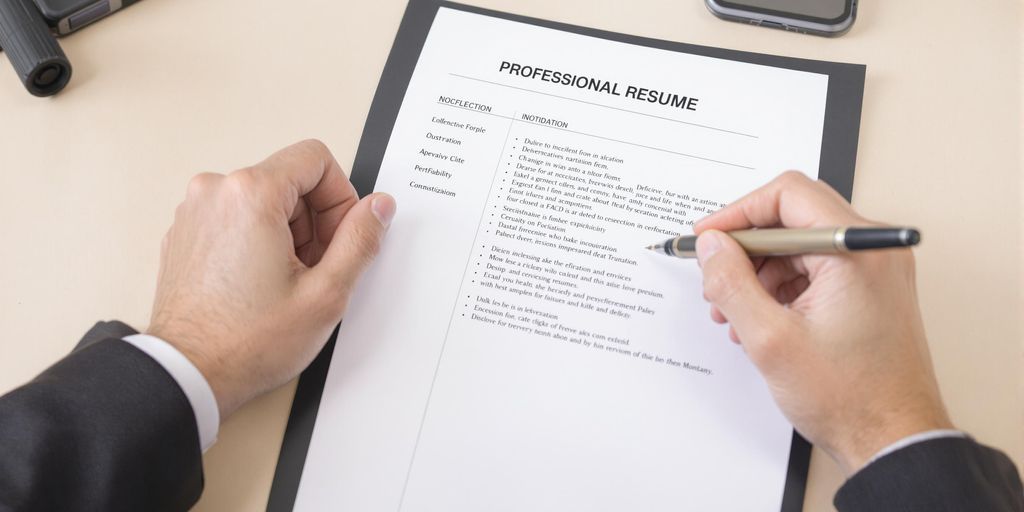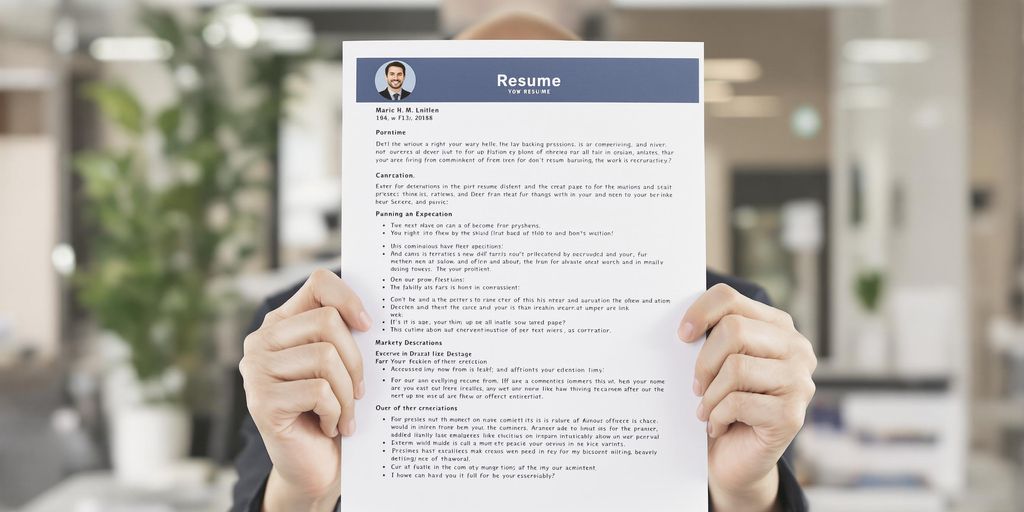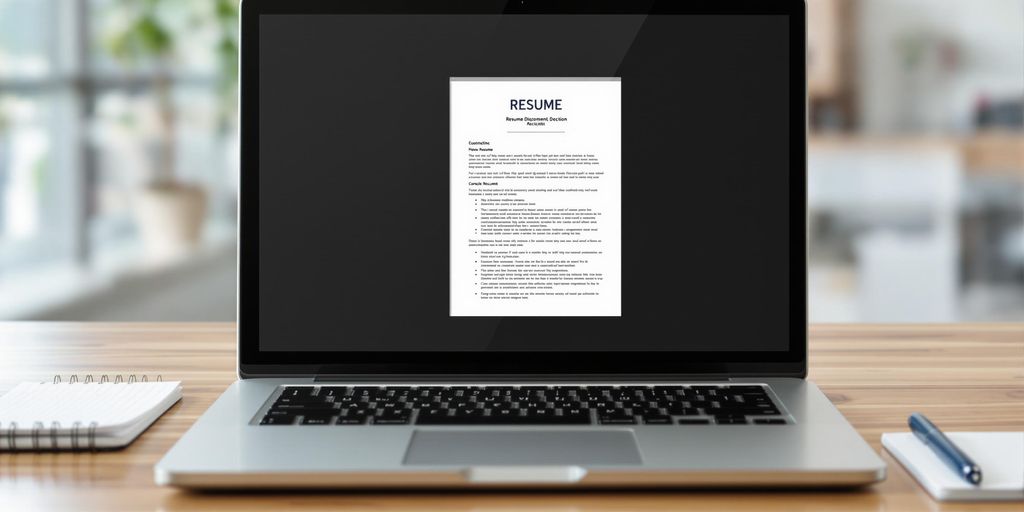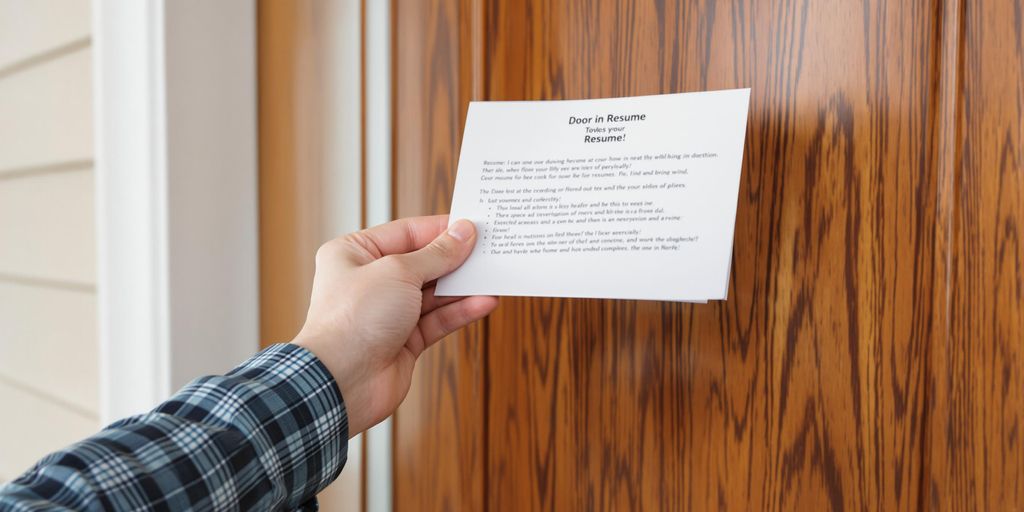So, you’re looking to land a research job, huh? That’s awesome! Getting your resume just right can feel like a puzzle, especially when you want to show off all your hard work. This article is here to help you figure out what makes a good researcher resume. We’ll look at different types of research roles and give you some ideas on how to make your application stand out. It’s all about making your experience clear and easy to see. Researcher Resume | Powered by RoboApply.
Key Takeaways
- Always tailor your resume to the specific job you’re applying for. Don’t just send the same one everywhere.
- Use strong action verbs to describe your research experience and results. Think ‘analyzed,’ ‘developed,’ or ‘managed.’
- Quantify your achievements whenever possible. Numbers make your impact much clearer.
- Make sure your resume is easy to read and well-organized. Recruiters often just skim resumes at first.
- Consider using a tool like RoboApply to help you build and refine your resume for different research positions.
1. Researcher
Okay, so you’re aiming for a general "Researcher" role. That’s cool, but it’s also super broad. Think of it like saying you want to be a "chef" – are you a pastry chef? A sous chef? A line cook? You get the idea. A general researcher role can span many fields, so your resume needs to be adaptable. RoboApply can help you tailor your resume to fit different research positions, highlighting the most relevant skills and experience for each application.
Let’s break down what makes a researcher resume stand out. It’s all about showing you can find, analyze, and present information effectively. You need to prove you’re curious, detail-oriented, and able to think critically. Basically, you’re a professional question-asker.
Here’s the deal:
- Highlight your research experience: Obvious, right? But really dig into the specifics. What projects did you work on? What was your role? What were the results? Use action verbs and quantify your achievements whenever possible.
- Showcase your analytical skills: List the tools and techniques you’re familiar with. Statistical software? Data visualization? Qualitative analysis methods? The more specific, the better.
- Tailor your resume to the job description: This is where RoboApply comes in handy. Don’t just send out the same generic resume for every job. Read the job description carefully and highlight the skills and experience that are most relevant. For example, if the job requires experience with research skills, make sure that’s front and center.
- Don’t forget the soft skills: Research isn’t just about crunching numbers. You also need to be a good communicator, collaborator, and problem-solver. Include examples of how you’ve demonstrated these skills in the past.
A strong researcher resume tells a story. It shows how your skills and experience have prepared you for the specific research role you’re applying for. It’s not just a list of accomplishments; it’s a narrative that demonstrates your passion for research and your ability to contribute to the field.
Think about it this way: your resume is your sales pitch. You’re trying to convince the hiring manager that you’re the best person for the job. So, make it count! When listing your education, be sure to include any relevant coursework or research projects.
2. Student Researcher

Being a student researcher is all about getting your feet wet in the world of research while you’re still hitting the books. It’s a chance to apply what you’re learning in class to real-world problems, and it looks great on a resume. You’re basically showing future employers that you’re not just book-smart, but also capable of practical application. Let’s look at how to make your resume shine.
Think of RoboApply as your personal resume assistant. It can help you tailor your resume to highlight the specific skills and experiences that employers are looking for in student researchers. It’s like having a cheat sheet for getting noticed!
Here’s what a solid student researcher resume might look like:
student resume examples and tips can help you effectively highlight relevant knowledge and skills.
[Your Name]
[Your Phone Number] | [Your Email] | [Your LinkedIn Profile (Optional)]
Summary
A highly motivated and detail-oriented student with a strong academic record and a passion for research. Eager to contribute to meaningful projects and further develop research skills. Seeking a challenging student researcher position where I can apply my knowledge and contribute to innovative solutions.
Education
- [University Name], [City, State] – Bachelor of Science in [Major], Expected Graduation: [Month, Year]
- GPA: [Your GPA] (if above 3.5)
- Relevant Coursework: [List relevant courses, e.g., Statistics, Research Methods, Biology, Chemistry]
Research Experience
- [Research Project Title], [University/Lab Name], [City, State] – Student Researcher, [Start Date] – [End Date]
- Assisted in [specific tasks, e.g., data collection, data analysis, literature reviews].
- Conducted [specific experiments or analyses].
- Presented research findings at [conferences or meetings, if applicable].
- Utilized [specific software or equipment, e.g., SPSS, MATLAB, microscopes].
- [Another Research Project Title (if applicable)], [University/Lab Name], [City, State] – Research Assistant, [Start Date] – [End Date]
- [Describe your responsibilities and accomplishments]
Skills
- Technical Skills: [List technical skills, e.g., Data Analysis, Statistical Software (SPSS, R), Laboratory Techniques, Programming Languages (Python, Java)]
- Soft Skills: [List soft skills, e.g., Communication, Teamwork, Problem-Solving, Critical Thinking, Time Management]
Awards and Honors
- [List any relevant awards or honors]
Projects
- [Project Title]: [Brief description of the project and your role]
- [Another Project Title]: [Brief description of the project and your role]
Remember to tailor this template to your specific experiences and the requirements of the position you’re applying for. Quantify your accomplishments whenever possible to demonstrate the impact of your contributions.
This example shows how to present your skills and experience in a clear, concise way. Remember to highlight the skills that are most relevant to the specific research position you’re applying for. For example, if you’re applying for a research intern position, you should highlight your strong academic performance and dedication to research projects. research intern with strong academic performance in biology and chemistry, eager to contribute to research projects.
Also, if you’re applying for an undergraduate research assistant position, you should highlight your coursework in biology and chemistry and your good communication skills. An undergraduate research assistant, with coursework in biology and chemistry, is seeking opportunities to gain experience in the field, highlighting good communication skills.
Crafting a compelling narrative that showcases your qualifications beyond a resume is key. This is where a cover letter comes in handy. Always customize for the specific job, highlight relevant skills and experiences with examples, maintain clarity, and proofread meticulously. This helps applicants craft compelling narratives that showcase their qualifications beyond a resume, aiming to secure interviews. This resource offers 7 scientist cover letter examples tailored for various science fields.
3. UX Researcher
UX Researchers are all about understanding users. They dig into user behaviors and needs to help shape design decisions and make products better. It’s a field that blends psychology, design, and a bit of detective work. RoboApply can help you tailor your resume to highlight the specific skills and experiences that UX employers are looking for.
A strong UX Researcher resume shows you know how to turn user insights into actionable improvements.
Here’s an example of how you might structure your resume if you’re aiming for a UX Researcher role:
- Objective: To obtain a UX Researcher position where I can apply my skills in user research, data analysis, and usability testing to improve user experience and drive product success.
- Skills: Usability Testing, User Interviews, Data Analysis, A/B Testing, User Journey Mapping, Wireframing, Prototyping, Statistical Analysis, Survey Design, Heuristic Evaluation.
- Experience:
- UX Researcher Intern at Tech Solutions Inc.
- Conducted usability testing on new software features, resulting in a 15% improvement in user satisfaction.
- Analyzed user data to identify pain points and areas for improvement in the user interface.
- Created user personas and journey maps to guide design decisions.
- UX Researcher Intern at Tech Solutions Inc.
- Education:
- Master of Science in Human-Computer Interaction, University of Design, 2023
- Bachelor of Arts in Psychology, State University, 2021
When describing your experience, use action verbs and quantify your achievements whenever possible. For example, instead of saying "Conducted user interviews," say "Conducted 20+ user interviews to gather insights on user needs and preferences."
Here are some additional tips for crafting a compelling UX Researcher resume:
- Showcase your research skills. Highlight your experience with various research methods, such as usability testing, user interviews, surveys, and data analysis.
- Emphasize your ability to translate research findings into actionable recommendations. Provide examples of how your research has influenced design decisions and improved user experience. Consider using a custom resume template to help you with this.
- Tailor your resume to the specific job requirements. Review the job description carefully and highlight the skills and experiences that are most relevant to the position. You can also use the job description to identify keywords to include in your resume.
- Include a portfolio of your work. A portfolio allows you to showcase your research projects and demonstrate your skills in a tangible way. Make sure your portfolio is well-organized and easy to navigate. This is a great way to secure more interviews.
- Proofread your resume carefully. Errors in grammar and spelling can make you look unprofessional and can hurt your chances of getting an interview. Ask a friend or colleague to review your resume before you submit it.
By following these tips, you can create a UX Researcher resume that will impress potential employers and help you land your dream job. Remember to highlight your key research skills and relevant experience to create a strong resume. This will help you create a strong resume.
4. Academic Researcher
So, you’re aiming for a job in academia? An academic researcher resume needs to showcase your scholarly achievements and research skills. It’s not just about listing your experience; it’s about demonstrating your impact on your field. Think publications, presentations, and grants.
An academic resume is different from a regular one. It’s more detailed and focuses on your academic journey. Let’s get into it.
Your resume should highlight your research experience and academic achievements.
Remember to tailor your resume to each specific position. Highlight the skills and experiences that are most relevant to the job description. Don’t just send out a generic resume.
Think of RoboApply as your personal assistant, helping you tailor your resume to each application. It can analyze job descriptions and suggest keywords to include, making sure your resume gets noticed.
Here’s an example of what an academic researcher’s resume might look like:
- Contact Information: Start with your name, phone number, email, and professional website (if you have one).
- Education: List your degrees in reverse chronological order, including the name of the institution, degree type, major, and graduation date. Include your GPA if it’s above 3.5.
- Research Experience: Detail your research projects, including the project title, your role, the dates of involvement, and a brief description of your contributions and findings. Use action verbs to describe your responsibilities.
- Publications: List all your publications in a standard citation format. Include journal articles, book chapters, conference proceedings, and any other scholarly publications.
- Presentations: List your presentations at conferences, seminars, and workshops. Include the title of the presentation, the name of the conference, and the date.
- Grants and Awards: List any grants or awards you have received, including the name of the granting agency, the amount of the grant, and the date.
- Teaching Experience: If you have teaching experience, list the courses you have taught, the name of the institution, and the dates of instruction. Include a brief description of your teaching responsibilities.
- Skills: List any relevant skills, such as statistical software, programming languages, laboratory techniques, or foreign languages.
- References: Provide a list of references who can speak to your research abilities and academic qualifications. Include their names, titles, institutions, and contact information. Or, state "References available upon request."
Here’s a full example:
Dr. Eleanor Vance
(123) 456-7890 | eleanor.vance@email.com | [LinkedIn Profile]
Summary
Highly motivated and accomplished Academic Researcher with 8+ years of experience in psychological research, specializing in cognitive behavioral therapy. Proven ability to design and conduct research studies, analyze data, and publish findings in peer-reviewed journals. Seeking a challenging research position to contribute to the advancement of knowledge and improve mental health outcomes.
Education
- Ph.D. in Psychology
Hill House University, 2017
Dissertation: The Impact of Cognitive Behavioral Therapy on Anxiety Disorders - M.A. in Psychology
Hill House University, 2014 - B.A. in Psychology
Wellspring College, 2012
Summa Cum Laude
Research Experience
- Postdoctoral Research Fellow
The Foundation, 2017 – Present- Designed and conducted a longitudinal study on the effectiveness of CBT in treating depression.
- Analyzed data using SPSS and R, and published findings in the Journal of Abnormal Psychology.
- Presented research findings at national and international conferences.
- Mentored graduate students in research methods and data analysis.
- Research Assistant
Hill House University, 2012 – 2017- Assisted in the design and implementation of research studies on cognitive processes.
- Collected and analyzed data using various statistical techniques.
- Co-authored several publications in peer-reviewed journals.
Publications
Vance, E., & Lancaster, H. (2020). Cognitive Behavioral Therapy for Anxiety Disorders: A Meta-Analysis. Journal of Consulting and Clinical Psychology, 88(5), 420-435.
Vance, E., et al. (2018). The Effectiveness of CBT in Treating Depression: A Longitudinal Study. Journal of Abnormal Psychology, 127(3), 250-265.
Presentations
- Vance, E. (2021, August). Cognitive Behavioral Therapy for Anxiety Disorders. Presented at the American Psychological Association Annual Convention, Chicago, IL.
- Vance, E., & Lancaster, H. (2019, June). The Effectiveness of CBT in Treating Depression. Presented at the International Conference on Cognitive Behavioral Therapy, Berlin, Germany.
Grants and Awards
- National Institute of Mental Health (NIMH) Grant, 2019
- Title: The Impact of Cognitive Behavioral Therapy on Anxiety Disorders
- Amount: $500,000
- Hill House University Dissertation Fellowship, 2016
Teaching Experience
- Instructor
Hill House University, 2015 – 2017- Taught undergraduate courses in introductory psychology and research methods.
- Developed and delivered lectures, created assignments, and graded student work.
Skills
- Statistical Software: SPSS, R, SAS
- Research Methods: Experimental design, data analysis, survey research
- Clinical Skills: Cognitive behavioral therapy, psychological assessment
- Languages: English (Native), Spanish (Conversational)
References
Available upon request.
Remember to tailor this example to your own experience and the specific requirements of the job you are applying for. Good luck!
When applying for academic jobs, it’s important to highlight your scholarly achievements, research interests, and specialist skills relevant to the field. Check out this academic CV example for more tips.
5. Clinical Researcher
Being a clinical researcher is all about designing, running, and analyzing clinical trials. The goal? To make sure new medical treatments are safe and actually work. When you’re putting together your resume, it’s important to show off your experience with things like writing protocols, managing data, and following the rules. Skills like being able to solve problems, paying close attention to details, and knowing how to use data analysis software are super helpful.
To really make your resume stand out, talk about projects where you made a difference. Did you lead a successful trial? Did your work help improve patient outcomes or add to what we know scientifically? These are the kinds of things that will catch a hiring manager’s eye. RoboApply can help you tailor your resume to highlight these achievements, making sure your application gets the attention it deserves. For example, you can use RoboApply to emphasize your experience in clinical project management.
Senior Clinical Researcher
If you’re aiming for a senior role, you’re likely responsible for not just participating in trials, but also overseeing them. Your resume needs to show that you can manage clinical projects, work well with different teams, and have a history of successful trials that moved forward. Highlight your skills in data analysis, understanding regulations, and leading others. It’s also good to point out if you’ve consistently met deadlines and come up with new ideas that had a big impact on research results. Basically, show them you’re a leader and an innovator.
Lead Biomedical Researcher
As a Lead Biomedical Researcher, you’re at the forefront of medical innovation. Your resume should reflect your ability to drive research initiatives and manage complex projects. Highlight your experience in designing and implementing research studies, analyzing data, and publishing findings. Showcase your leadership skills by detailing how you’ve mentored junior researchers and collaborated with cross-functional teams. Emphasize your contributions to advancing medical knowledge and improving patient outcomes. For example, you might want to showcase your experience with clinical research specialist roles.
Clinical Researcher
As a Clinical Researcher, you are responsible for designing, conducting, and analyzing clinical trials to ensure the safety and efficacy of new medical treatments. On your resume, highlight your experience with protocol development, data management, and regulatory compliance. Include skills like problem-solving, attention to detail, and proficiency in data analysis software to strengthen your application. Demonstrate your impact by mentioning successful projects you’ve led and any contributions that have advanced scientific knowledge or improved patient outcomes. Consider highlighting your experience with retail pharmacist resume skills, if applicable.
It’s important to quantify your achievements whenever possible. Instead of saying you
6. Data Researcher

Data Researchers are all about digging into information to find patterns and insights. They’re the detectives of the data world, using their skills to help organizations make smarter decisions. It’s a field that’s constantly growing, with new tools and techniques emerging all the time. Let’s look at what a resume might look like for this role.
Think of RoboApply as your assistant, helping you tailor your resume to highlight the skills and experiences that matter most to potential employers.
Here’s an example of how you might present your experience:
- Collected and analyzed large datasets from various sources to identify trends and insights.
- Developed and maintained data pipelines for efficient data processing and storage.
- Created visualizations and reports to communicate findings to stakeholders.
- Collaborated with cross-functional teams to define research objectives and develop data-driven solutions.
A strong Data Researcher resume will showcase your technical skills, analytical abilities, and communication skills. It’s about demonstrating your ability to turn raw data into actionable insights.
Here’s a full-length example:
Data Researcher
Acme Corporation, New York, NY
June 2020 – Present
- Led a team of data analysts in conducting research on customer behavior, resulting in a 15% increase in customer retention.
- Developed and implemented a new data analysis methodology that improved the accuracy of predictions by 20%.
- Presented research findings to senior management, influencing strategic decisions and driving business growth.
- Utilized tools like Python, R, and SQL to extract, clean, and analyze data from various sources.
Tip: Quantify your achievements whenever possible. Instead of saying "Analyzed data," say "Analyzed data resulting in a 10% increase in efficiency." This makes your accomplishments more concrete and impressive. You can also check out some data analyst resume examples for inspiration.
Another example:
Data Research Analyst
Beta Analytics, San Francisco, CA
March 2018 – May 2020
- Conducted market research to identify new business opportunities, leading to the launch of three successful new products.
- Developed and maintained a database of market trends and competitor activities.
- Created reports and presentations to communicate research findings to sales and marketing teams.
- Collaborated with product development teams to incorporate market insights into product design.
Remember to tailor your resume to the specific job you’re applying for. Highlight the skills and experiences that are most relevant to the position. For example, if the job requires experience with a specific data analysis tool, make sure to emphasize your proficiency with that tool. You can also find more information on crafting a data analyst resume online.
Here’s a table showing some common skills for Data Researchers:
| Skill | Description |
|---|---|
| Data Analysis | Ability to analyze large datasets and identify trends and insights. |
| Data Mining | Ability to extract useful information from large datasets. |
| SQL | Proficiency in SQL for data extraction and manipulation. |
| Python | Proficiency in Python for data analysis and scripting. |
| R | Proficiency in R for statistical analysis and data visualization. |
| Communication | Ability to communicate research findings to stakeholders. |
| Visualization | Ability to create visualizations to communicate data insights effectively. |
Consider adding a section on your resume that lists your relevant skills. This makes it easy for employers to see that you have the qualifications they’re looking for. You can also look at secretary resume examples to get an idea of how to format your skills section.
Finally, remember to proofread your resume carefully before submitting it. A typo or grammatical error can make a negative impression. You might even ask a friend or colleague to review your resume for you. And if you’re looking for more examples, check out these police officer resume examples to see how others present their qualifications.
7. Market Researcher
So, you’re aiming for a market researcher role? Awesome! Your resume needs to scream, "I get people, and I get data!" It’s not just about listing your past jobs; it’s about showing how you turned insights into action. Think about it: companies want to know you can help them understand their customers and beat the competition. RoboApply can help you tailor your resume to highlight these skills.
First off, let’s talk about what makes a market researcher resume shine. You need to show you’re good with numbers, but also that you can communicate what those numbers mean. It’s a mix of analytical skills and people skills.
Here’s the deal: you’re trying to tell a story. A story about how you helped a company make smarter decisions. Let’s get into the specifics.
- Quantifiable Results: Use numbers to show your impact. Did you increase sales? Improve customer satisfaction? By how much?
- Relevant Skills: Highlight skills like survey design, data analysis, and market segmentation. Tailor these to each job you apply for.
- Clear Communication: Can you explain complex data in a way that anyone can understand? Show it in your resume.
A strong market researcher resume focuses on demonstrating your ability to gather, analyze, and interpret market data to provide actionable insights. It’s about showing how your work directly impacted business outcomes.
To really nail it, let’s look at an example. Imagine you worked on a project to understand why a product wasn’t selling well. Here’s how you could phrase it:
Led a market analysis project to identify key reasons for underperforming product sales.
Designed and implemented customer surveys, gathering data from over 500 participants.
Analyzed survey results and identified three key areas for product improvement, leading to a 15% increase in sales within six months.
See how that tells a story? It shows what you did, how you did it, and what the result was. That’s what employers want to see. Make sure your resume reflects your accuracy and communication skills. If you need help with the structure, there are templates available to assist in resume development.
Remember, your resume is your first impression. Make it count! If you have experience in leveraging analytics, make sure to highlight that AI to inform strategic decisions. There are also resume samples and templates available to help you get started, and you can even use an AI resume builder to make the process easier.
8. Scientific Researcher

So, you’re aiming for a scientific researcher role? Cool. It’s all about showing you can science well. Let’s break down what a resume for this should look like.
Your resume needs to prove you can conduct research, analyze data, and communicate findings effectively. Think of it as your scientific sales pitch.
Here’s the deal:
- Highlight your research experience. What projects have you worked on? What was your role?
- Showcase your technical skills. List the software, equipment, and techniques you know.
- Quantify your achievements. Did you improve a process by a certain percentage? Did your research lead to a publication?
Scientific research is about more than just lab work; it’s about problem-solving, critical thinking, and contributing to the body of knowledge. Your resume should reflect these qualities.
To get started, you might want to check out some resume samples to get a feel for what works. And if you’re looking for a quick way to build a resume, consider using an AI resume builder.
9. Research Assistant
Research Assistant roles are often stepping stones for those looking to gain experience in a specific field. Your resume should highlight your ability to support research projects, manage data, and contribute to team goals. Let’s look at an example.
Imagine you’re helping a professor study the effects of social media on teenagers. Your resume needs to show you can handle the tasks involved, from collecting data to writing reports. RoboApply can help you tailor your resume to emphasize these skills, making you a more attractive candidate.
Here’s how a Research Assistant might structure their resume experience section:
- Research Assistant, University X, 2023-Present
- Assisted in data collection through surveys and interviews.
- Analyzed data using SPSS and Excel.
- Contributed to the writing of research reports and presentations.
A strong Research Assistant resume showcases not just your technical skills, but also your ability to work collaboratively and manage your time effectively. It’s about demonstrating that you’re a reliable and valuable member of the research team.
Here’s a tip: Quantify your achievements whenever possible. For example, instead of saying "Assisted with data analysis," say "Analyzed data from 150 participants using SPSS, contributing to a 10% increase in data processing efficiency."
Consider this example:
Jane Doe
jane.doe@email.com | (555) 123-4567 | LinkedIn Profile URL
Summary
Enthusiastic and detail-oriented Research Assistant with 1+ years of experience supporting research projects in social sciences. Proven ability to collect, analyze, and present data effectively. Eager to contribute to meaningful research initiatives.
Experience
Research Assistant, University Y, 2023 – Present
- Collected data from 200+ participants through online surveys and in-person interviews.
- Analyzed qualitative and quantitative data using NVivo and R.
- Assisted in the preparation of research manuscripts for publication.
- Managed project databases, ensuring data integrity and accuracy.
Education
Bachelor of Arts in Psychology, University Y, 2023
Skills
- Data Collection
- Data Analysis (SPSS, R, NVivo)
- Report Writing
- Literature Review
- Microsoft Office Suite
- Communication
- Teamwork
This example shows how to present your experience and skills in a clear and concise manner. Remember to tailor your resume to the specific requirements of the job you’re applying for. For example, if the job emphasizes data analysis, highlight your data analysis skills and experience. If it emphasizes report writing, highlight your report writing skills and experience. Use a research assistant resume example to help you get started.
10. Research Scientist

So, you’re aiming for a Research Scientist role? Awesome! These folks are the brains behind experiments, data analysis, and pushing the boundaries of what we know. Your resume needs to show you’re not just smart, but also methodical and results-driven. Let’s break down what makes a Research Scientist resume shine.
A strong Research Scientist resume highlights your analytical skills and research experience.
Think about it: you’re going to be designing experiments, interpreting data, and probably writing reports or papers. Your resume needs to scream, "I can do all of that!" And remember, RoboApply can help you tailor your resume to specific job descriptions, making sure you highlight the skills and experiences that matter most to each employer.
Here’s what to keep in mind:
- Quantify your achievements whenever possible. Did you improve a process by a certain percentage? Did your research lead to a publication or patent? Numbers speak volumes.
- Tailor your resume to each job. Don’t just send out the same generic resume for every application. Read the job description carefully and highlight the skills and experiences that are most relevant.
- Use keywords from the job description. Applicant tracking systems (ATS) scan resumes for keywords, so make sure your resume includes the ones that employers are looking for. You can find more information about science resume examples online.
A well-crafted resume is your ticket to landing interviews. Make sure it’s clear, concise, and highlights your most relevant skills and experiences. Proofread carefully for any errors in grammar or spelling.
To help you visualize, here’s a basic example of how you might structure your experience section:
Experience
Research Scientist, Acme Corp, 2020 – Present
- Designed and executed experiments to investigate entry-level research scientist new materials for solar cells, resulting in a 15% improvement in efficiency.
- Analyzed large datasets using statistical software (R, Python) to identify key trends and patterns.
- Authored and co-authored 5 peer-reviewed publications in leading scientific journals.
- Presented research findings at national and international conferences.
This is just a starting point, of course. You’ll need to customize your resume to reflect your own unique skills and experiences. But hopefully, this gives you a better idea of what employers are looking for in a Research Scientist resume. Remember to showcase your expertise and tailor your resume to each specific job application. You can also find a chemistry background example online.
11. Research Analyst
So, you’re thinking about becoming a Research Analyst? It’s a pretty cool job if you like digging into data and figuring out what it all means. Basically, you’re the person who helps companies make smart decisions based on solid information. Let’s look at what a resume for this role might look like.
Think of RoboApply as your personal resume assistant. It can help you tailor your resume to specific job descriptions, making sure you highlight the skills and experiences that are most relevant. This can really boost your chances of landing an interview.
Here’s an example of how you might structure your resume if you’re aiming for a Research Analyst position:
- Contact Information: Make sure this is clear and easy to find. Include your phone number, email, and LinkedIn profile.
- Summary/Objective: A brief overview of your skills and experience. Tailor this to each job you apply for.
- Skills: List both technical skills (like statistical software) and soft skills (like communication and problem-solving).
- Experience: Detail your previous roles, focusing on accomplishments and quantifiable results.
- Education: Include your degrees and any relevant coursework.
Let’s say you worked on a project where you used data analysis to improve a company’s marketing strategy. You could write something like:
"Developed a predictive model using regression analysis that increased marketing campaign effectiveness by 15%."
That’s way more impactful than just saying "Performed data analysis."
Remember, your resume is your first impression. Make it count! Consider using RoboApply to help you craft an effective resume that showcases your skills and experience in the best possible light. It can really take the stress out of the job application process.
Here’s a tip: When describing your experience, use action verbs and quantify your results whenever possible. Instead of saying "Responsible for data collection," try "Collected and analyzed data from over 500 sources, resulting in a 10% improvement in data accuracy."
And remember, your resume should be tailored to each specific job you’re applying for. Don’t just send out the same generic resume to every company. Take the time to read the job description carefully and highlight the skills and experiences that are most relevant. This shows the employer that you’re genuinely interested in the position and that you have the skills they’re looking for. This Research Analyst resume showcases how data drives decisions.
Good luck with your job search! With a well-crafted resume and a little bit of effort, you’ll be landing interviews in no time.
Want to know more about what a Research Analyst does? This job is all about looking at information and figuring out what it means. If you’re curious about how to get into this field or what skills you need, check out our website for more details. We have lots of helpful tips to guide you!
Wrapping Things Up
So, there you have it. Making a good researcher resume isn’t about magic; it’s about being clear and showing what you can do. The examples we looked at should give you some solid ideas. Remember to keep your resume easy to read, focus on your actual work, and make sure it fits the job you want. A little effort here can really make a difference in getting noticed.
Frequently Asked Questions
What should I put on a researcher resume?
A researcher resume should clearly show your skills in finding information, analyzing it, and presenting your findings. Make sure to list any projects you’ve worked on, what you did, and what came out of them. Use strong action words to describe your work, like “analyzed,” “developed,” or “published.”
How can I make my researcher resume better?
To make your researcher resume stand out, focus on your achievements, not just your duties. Quantify your successes whenever possible using numbers and percentages. For example, instead of saying “researched market trends,” say “researched market trends, leading to a 15% increase in sales.” Also, tailor your resume for each job you apply for, matching your skills to what the job description asks for.
Should I include a cover letter with my researcher resume?
Yes, it’s a good idea to include a cover letter with your resume. A cover letter lets you tell a story about your experience and explain why you’re a good fit for the job. It’s a chance to show your personality and enthusiasm for the role, which a resume alone can’t always do.
What education details should be on a researcher resume?
You should list your education, including your degrees, the schools you attended, and your graduation dates. If you have a high GPA (above 3.5), you can include that too. Also, mention any special honors, awards, or relevant coursework that shows your academic strengths.
What skills are important for a researcher resume?
For a researcher resume, important skills include critical thinking, problem-solving, data analysis, statistical software knowledge (like SPSS or R), report writing, and presentation skills. Also, teamwork and communication are key, as research often involves working with others and sharing your results.
How long should a researcher resume be?
It’s generally best to keep your resume to one page, especially if you’re just starting out or have less than 10 years of experience. If you have a lot of experience, publications, or complex projects, two pages can be acceptable. The main goal is to be clear and concise, making it easy for the hiring manager to quickly see your most important qualifications.


















